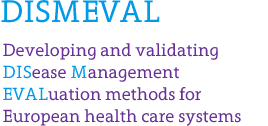Structured disease management is widely seen as a means to improve the quality and reduce the cost of care, and to improve health outcomes for the chronically ill. Yet, while intuitively appealing, the evidence on the ability of such approaches to actually do so remains uncertain. What we know about the impact of disease management is mainly based on small studies on high-risk patients, often undertaken in academic settings. There is a need to learn more about the effects of large, population-based programmes using universally accepted evaluation methods that are scientifically sound and are also practicable in routine settings.
The DISMEVAL project aimed to support this process through reviewing approaches to chronic care and disease management in Europe and through testing and validating possible evaluation methods and so provide evidence for best practices.

